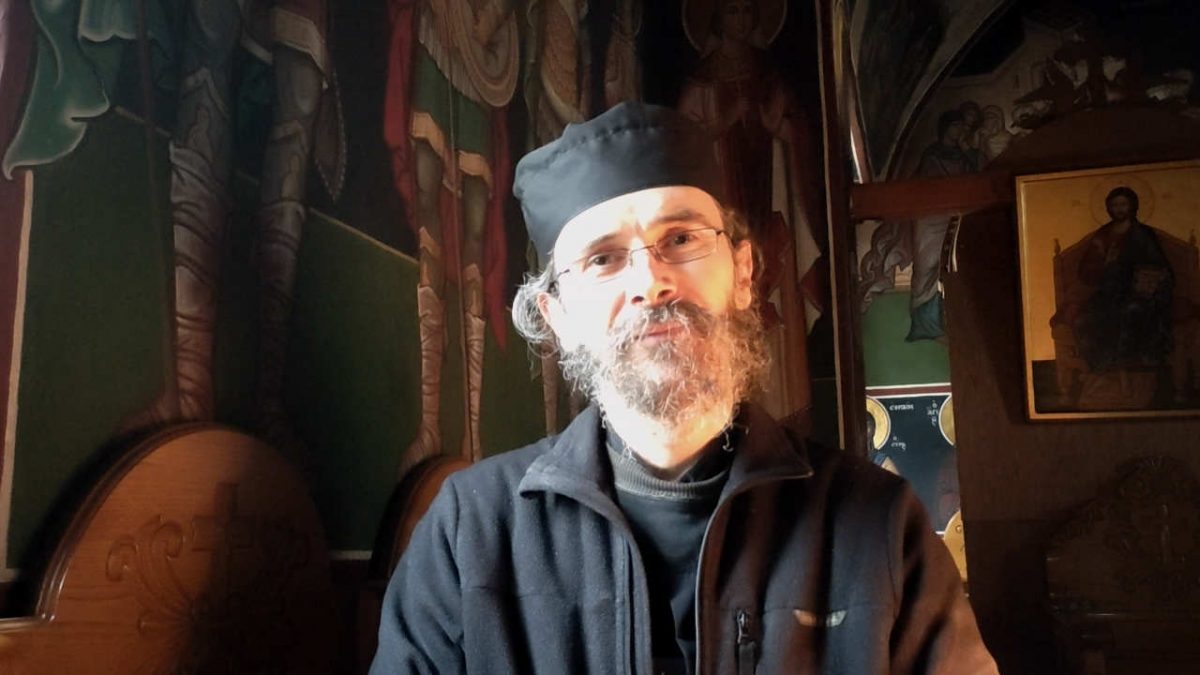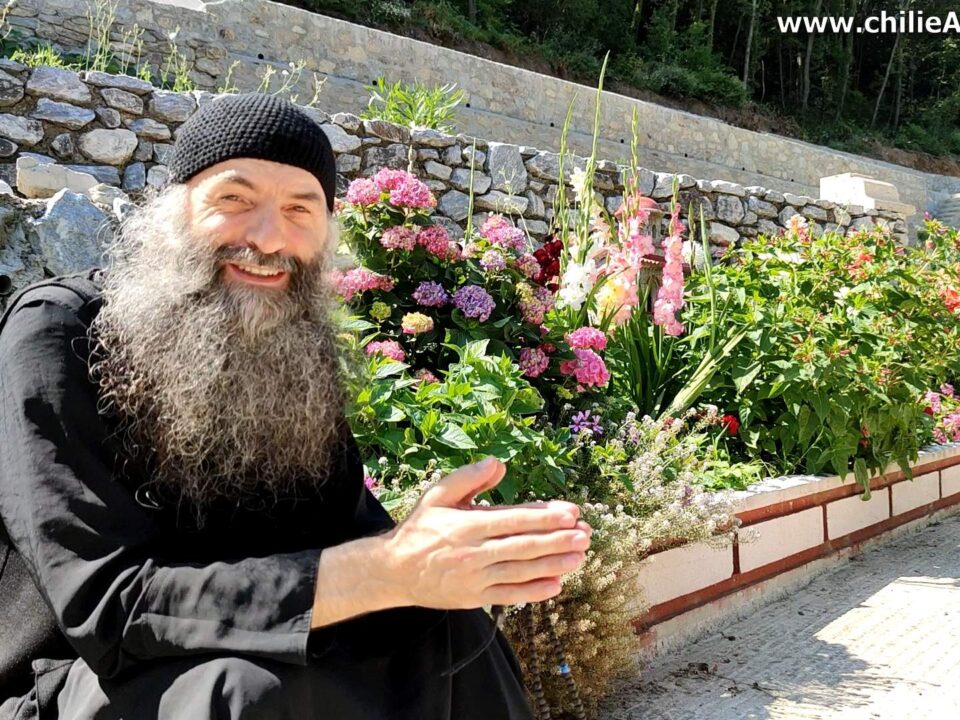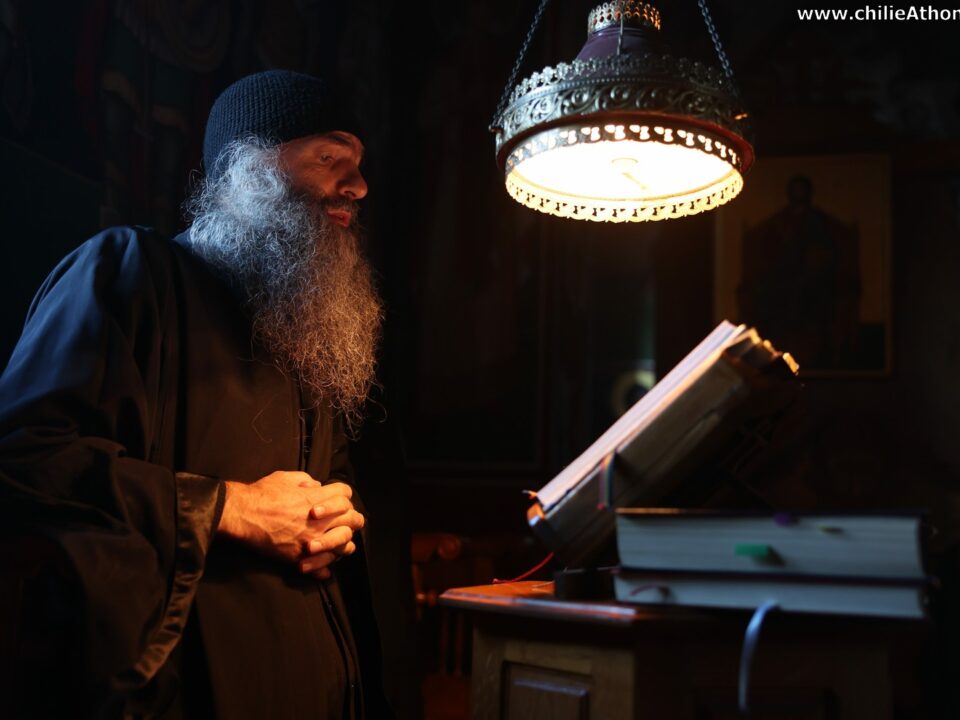
How I Came to Athos – Father Pimen Vlad
17 February 2022Anger is one of the most powerful but also one of the most misused parts of the soul. Watch Father Theologos explain the mechanisms of anger and their therapeutic.
Enjoy!
Glory to the Father, and to the Son, and to the Holy Spirit, now and forever and unto the ages of ages. Amen.
Through the prayers of our holy Fathers, Lord Jesus Christ, Son of God, have mercy on us! Amen.
Today we are going to talk a little bit about anger because, unfortunately, it is a part of the soul that is used a lot today, but unfortunately, it is not used correctly by most of us. We say, “Let’s not get angry.” That is correct, but not getting angry does not mean being a wimp or being a vegetable. This is very important.
We must know that hesychia, stillness, is actually a very, very active state in which evil is rendered inoperative. It is a very attentive, watchful, state. This is hesychia. They are called niptic fathers, watchful fathers, those who are very, very careful so that the evil inside them, the hatred inside them does not come out. And when that hatred doesn’t come out, then that hatred will wither, it will be strangled and die. So that’s what needs to be done.
The big problem with anger is that we get angry at people. We must never get angry at people. We should only be angry with ourselves. We are the only person we need to be angry with.
We will always get angry at deeds.
Meaning, something happened, Bam! I have to have the firmness, the courage to know how to handle the particular deed, so that it doesn’t happen again, if that action is considered bad, if it is not an expression of love. And of course we must ask, consult, so as to avoid passion, to avoid a mistake, to avoid deception.
Of course, righteous anger is the anger against sin. You must know that anger also keeps him who is angry without sin, and raises him who has slipped.
But to be angry with one who has sinned, with one who has wounded, who has done wrong, who has troubled, you should know, that this anger endangers the one who is angry even if his anger is justified, so to speak. That is if he rages against the deed. If he rages against the sinner, it is clearly not good.
This is why we need to be very careful, to keep it in check and in general to not use it. Only when God gives us people in our hands, meaning we are institutions, we are abbots, confessors, heads of families, heads of companies, etc., certain positions in which we must act firmly.
In order not to let ourselves be dragged by this firmness into sin, we must always think that the other has done well, or rather, has tried to do good. Because for each one of us “good” is dependent on faith, on optics. Meaning, “I think I’m doing good in this way.” Of course, if my view, if my belief is wrong, my good deed will not be perfect. Beyond that, it’s not only about faith, but also about not knowing how to do good. It’s also about the fact that it failed, that I couldn’t do good. A lot of factors.
That’s why it’s very important that when we see that someone has done something wrong, beyond our awareness of our relativity: “Well, wait a minute, maybe I’m wrong and not the other,” but even if I think that the other is wrong, in that case we will not judge on his character, because, first of all, the Lord said that the judgement is His, and secondly, as I said – we don’t know, maybe he wanted to do good and he did not succeed and so on.
That’s why we will always focus on the act. And if we focus on the act, it must be very clear to us and to the other person that the act and I are not against him, but rather him and I are together against the act. This is very important. So I should always speak with love to the other and have love inside for the other and I should always try to help him when he can be helped and if able to help the other. Understand? This is very important.
And because of this, we should always know when we see that the love between us and the other person is diminishing meaning we get troubled, we get angry, at that moment, we stop. And because we are sinners and this happens in many cases, the first victory against anger is the silence of the mouth. Let’s keep our mouths closed. Let’s not talk. This is the first step. The moment we are boiling inside we won’t open our mouths.
We can’t? We leave, we change the subject, look in a bag, we do something. Don’t let it get out of us! It is not good! We’re not going to talk on a subject that is sensitive, that we know at least one of the interlocutors gets angry about.
This situation must be avoided because it is passion, it is sickness, it is pain. Like if I put my hand on someone, it is a sign of love towards that person, but if they have a wound there and I put my hand on it, they will scream.
At first God forgives me, so to speak, but if I know that he has a wound and I put my hand there, God won’t forgive me because He knows I did it on purpose, to hurt the other person and it’s not good.
It’s the same with anger – when we know that someone is getting angry, or we see that he is angry, we will not open our mouths, we keep silent, we humble ourselves. This is the first victory against anger.
The second, higher victory against anger is when the heart is no longer so troubled, is no longer boiling and we do not receive thoughts against the other, that is, the thoughts are silent, if we are a little troubled, disturbed by the attack of the other’s hatred. Because the attack of anger is an attack of hate.
And I said that we must hate only sin, only evil deeds, we must never hate people! And this is the second step. That is, to not march on the subject of thoughts, to not receive thoughts against the other. We say that the other, poor thing, is sick, he has a burn, he tried to do good… and all that. And pray to God: “Lord, help me to love my brother! Almighty God, give me Your almighty love.” That is very important.
And the third stage against anger is serenity against any wind, any storm of anger from others, from life, from troubles. And when man is serene, he can overcome anything, and this serenity comes from God.
It comes through much prayer, much humility and acceptance of things as they are, and especially through self-condemnation, that is, we get angry at ourselves.
I said that the only person we need to be angry with is ourselves, by being attentive and especially by cutting off our will, by the exercise of cutting off our will. We should know that anger comes from cutting off the will. The stronger the will, the greater the anger, the greater the pain.
This is why we must be careful not to absolutize our will! Let’s not absolutize our will let’s always do training in this area.
Meaning, I am going to cut off my will every day. If the thought comes: “I wonder what will be on the table?” Bam! I cut off my will and don’t ask. Or, I see that there is a discussion, “What are they discussing? I’ll go ask.” I won’t ask! Or, “Ah, I want to say something in the discussion.” I’m not going to say it! “I want to know what’s on the news, what else is happening?” No, I won’t ask! Do you understand?
If I cut off my will in small things, then I will end up cutting off my will in the big things. And then I’ll end up being able to cut off my will before many people. That’s very important. And then the person will be calm, he will be serene, as I was saying, in the face of any wind.
As I am now, with God’s gift and your prayers, I am very serene. I’m in the church, there is a storm outside, it’s windy. Eh, it’s from God, it happened for my sins, I humble myself, I come and talk here. Do you understand? That is very important.
So as I was saying, let’s not march the moment we have a fight between us. It’s existential distortion, it doesn’t work well. Let it pass by! And after it has passed like water under the bridge, after it has passed like the wind outside, “Like long clouds on the plains” as Eminescu says, afterwards we will talk.
Because if the dark wave of anger comes, the mind is darkened. Anger is dark, it clouds the mind and to fight this dark wave of anger, we do what we do in swimming. Swimmers know you have to get underwater, the wave comes, you get under the wave and you cross to the other side. In a humble position you cross to the other side. If you try to fight the wave, it takes you away, it drags you and can throw you into the rocks and make you dust and powder. We are not against the wave.
That’s why, in order to go beyond the wave, we humble ourselves, we don’t attack, we stand still. This is gentleness. Gentleness is the still state of the soul which is the same in both reproaches and praises, you should know.
That’s why those who want praise are continually troubled. Those who want vainglory are continually troubled. That is why, let’s be careful not to love ourselves, and not to love being praised because all this comes from self-love, from selfishness. If I don’t love myself then I won’t have my own will and I won’t get angry and it won’t hurt. Do you understand?
Anger is therefore kept under control by mercy, by this spirit of meekness, by letting things go in favor of the other. by much prayer, and it also helps a lot to hold justice against myself, that is, to condemn myself – to say “Well, God is almighty! How many times have I been wrong before God and He didn’t get angry. Why should I be angry with my brother? No, since I owe 10,000 talants… as the parable in the Gospel says, and God forgives me all. Why should I chase the one who owes me 100 denarii?” 10,000 talants was a huge sum, you should know. They were around 32 000kg of gold While 100 denarii were… I don’t know how many grams of silver, something insignificant. Understand?
That’s why it’s very, very important to be angry with myself, to be righteous with myself, because if I don’t judge myself, then I won’t be able to judge things right – not people – as I said, people are never judged. We always have to love people.
That’s why if we have this awareness of our eternity, of God’s omnipotence, then we will not be angry. I will think, “Well, wait a minute, I am an eternal being, I live billions and billions of years; will I be angry for yesterday’s deed? Will I be angry for yesterday’s smoke that has passed away? This is man: he is smoke, he is wind, nothing. Do you understand? That is very, very important. How many sins do we commit in thought, word, and deed of course? Eh, and then we condemn the other, we get angry at the other?
Beware that if we do not condemn ourselves, the devil will condemn us, you should know. It is very important. Let us condemn ourselves. This is very important.
Now, we should know that we have to distinguish between the personal and the community plan.
If on the personal level we have to be totally and utterly meek, we turn the other cheek, according to the Lord’s command, at the community level, we cannot impose this form of asceticism on others. So if someone comes and gets angry and is attacking my wife, my family, even my company, my nation, I’m not just going to stand by, I’m not going to turn the other cheek, that’s when we have to fight back.
Of course, never as a form of passion, let us always be careful not to do our own will, rather in consensus, with guidance, and we will discuss and decide how we should act firmly so as to protect those God has given us to care for. And then of course we will use the anger part of our soul correctly. And the right use of the anger part of our soul is this firmness this courage, the courage of the good deed. So we will say, “No, we will not allow you to be attackers, enemies of the nation or enemies of the family.”
But unfortunately today the opposite is happening. Meaning, we are very harsh with our family and we fight like mad men among ourselves. And with those who attack our family, we are very permissive. Brethren, it is not good! Do you understand? It must be exactly the other way around. With family, if we get angry, we have to ask for forgiveness, to have the courage to ask for forgiveness, to not let things get gangrenous if something has come out of our mouths. That is very important.
We must always win peace, not war! The strong win the war. The meek win peace. And this peace in the family, in the community comes through protection. And of course we will only apply this firmness when God validates us in a particular position. Meaning, if we are, for example, of a certain rank in the army, or if, for example, we are the head of a family, if we are an abbot, or if we are a spiritual father, heads of companies if we have people under us, under our command, then we will have this firmness, we will say “Nope! You won’t do that!” Or, “This is not right.” Do you understand? It is very important.
Of course, it must be said: up to the limits of sin and always with love for the other. We should always think that the other is our brother, who cannot get out of sin because he does not know, does not want to, does not have the necessary information, does not have the necessary experience, in the case of children, for example. Then we must apply this firmness.
But all this must be done under obedience to God, and as I said, not when the other person is angry, not when the other’s mind is darkened. There are cases like this. But let us always be in a disposition to not be angry, to be firm, not angry, to have love towards the other, and if we can correct, to do so when we are both calm. That’s when it must be done. Not immediately.
Immediately only in very special cases and there is special training for special cases. They are even called special forces: the fire brigade does special training, the army does special training, the ambulance does special training so that they act firmly, immediately. Do you understand? Because man is not made to act like that.
So let’s not act like this! Let’s not hurt others, to not cause them wounds, to not slap love because that’s not how anger should be used! Anger is used in the sense of courage. The courage of the good deed, the courage of love.
Let’s have the courage to love!
Let’s have the courage not to be angry with others! This is the proper use of anger.
Please forgive me!
Through the prayers of our holy Fathers, Lord Jesus Christ, Son of God, have mercy on us! Amen.
Online commemoration lists and donations
May the Lord help us!
Online Commemoration Lists and Donations
May the Lord help us!
If you have a bank card and wish to send commemoration lists and donations online using your card, and/or to support our philanthropic activity, including this site, please fill out the form below to make a small donation. The form is secure – we use Stripe for payment processing – a world leader in this field. We do not collect your personal data.
If you do not have a card, or do not wish to use it, visit the webpage for Online Donations and Commemoration Lists.
We will pray for your loved ones! (Please do not include inessential details like wishes, degree of kinship, introductions etc. JUST the name!)
Especially for recurring commemoration lists, we ask that you please keep them to under 20 names long. If you include a member of the family, we add “and for their families.”







